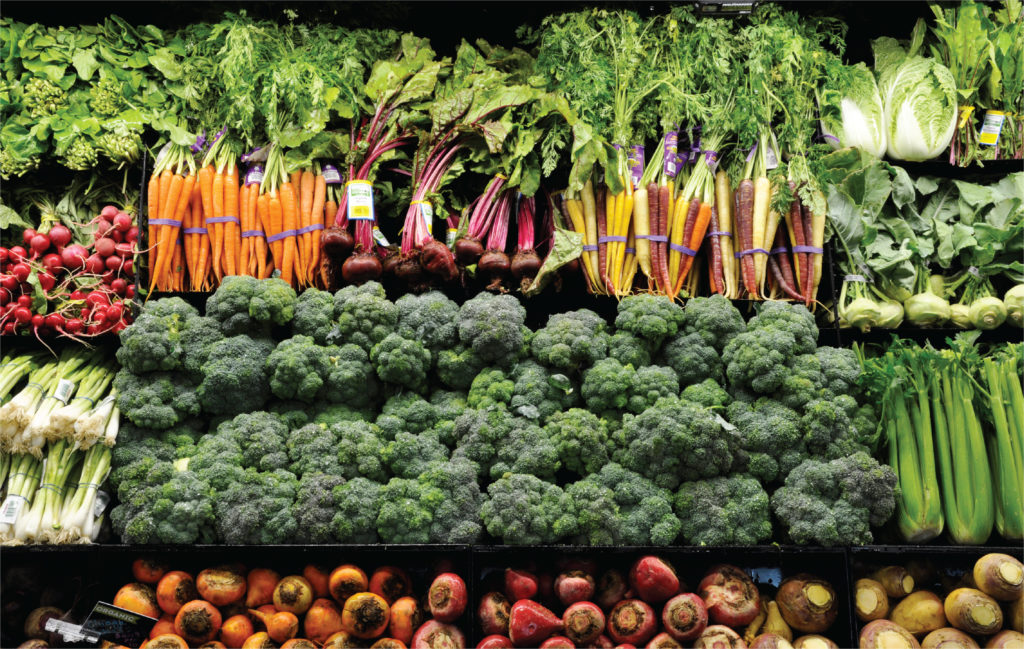Sustainable Shopping Tips

We all make purchasing decisions in our daily lives that have lasting impacts on our environment, local economy, and even future generations. From buying local whenever possible to refilling containers when buying in bulk and using reusable produce bags, the small changes we make in favor of sustainability add up to big impacts over time. Here are some of our favorite sustainable shopping tips.

Think of food miles and seasonality when choosing between brands or planning your meal.
Not only does buying locally made and -grown products strengthen the local economy, it also reduces the energy and resources needed to transport food to your table. By eating fruits and veggies that are in-season and grown locally whenever possible, you’ll be inherently reducing your food miles and carbon footprint. As an added bonus, locally produced fresh fruits and veggies are usually more flavorful and nutrient-rich than their non-local counterparts because they spend less time in transit and reach your plate closer to the time of harvest.

Consider packaging, and always choose the product with the least waste — especially plastic.
When shopping, actively look for food options with the least packaging. It’s a different focus than many of us are used to, but opening our eyes to unnecessary packaging makes a huge difference in reducing waste. A good first step is to actively avoid plastic packaging whenever you can. Are there two options for the same or similar products, but one is in plastic? Choose the no-plastic option. Though it may be recyclable, plastic requires energy and materials that are not sustainable for the environment and may be harmful to our bodies. When possible, opt for foods with packaging that’s recyclable or compostable.

Buy in bulk.
Save on packaging waste, food waste, and money when you shop the bulk aisle. Get only what you need, when you need it so you can avoid throwing out extra food. Buying spices in bulk is a great way to start; you’ll save money and they’ll taste stronger and fresher than buying them prepackaged. Pro tip: Bring in your clean and empty containers from home and refill them with bulk foods.* Just remember to use the scale in the bulk aisle to find the tare weight before filling them. That way you’ll only be charged for what’s inside, not the weight of your container. (Our friendly cashiers are happy to help with this too!) Learn more details about the benefits of buying in bulk.

Consider working some plant-based proteins into your diet.
Plant-based proteins use far fewer resources to produce and typically have a much lower carbon footprint than traditional meat products. It’s not just tofu and tempeh anymore; you’ll find many delicious plant-based alternatives in our refrigerated and freezer sections. Or, for an even simpler plant-based protein option, consider working nuts, beans, legumes such as lentils, and protein-rich grains like quinoa and amaranth into your meal rotation. It doesn’t have to be an all or nothing endeavor; you can start by opting for plant-based proteins one meal a day or one day a week for an attainable (and delicious!) starting point.

Don’t forget to bring your reusable shopping bags!
Reduce waste when you avoid paper (and especially plastic) shopping bags. Plastic bags are not easily recyclable, usually requiring a special trip to drop them off at a place where recycling facilities for them exist. Though paper bags are recyclable, they still require resources and energy to make and to recycle after you’re done with them. Instead, opt for reusable bag options. Our stores even offer a 5¢ bag credit for each reusable shopping bag you use. Let the cashier know if you’d like to take the bag credits off your bill or donate those 5¢ bag credits to the monthly Round Up recipient. Storing your reusable bags in the trunk of your vehicle (and going back for them when you forget to bring them in) is a good way to get into the habit of using reusable bags.
As you begin (or expand) your sustainable shopping habits, be gentle with yourself and remember that sustainability isn’t an all or nothing endeavor. Start with a few small changes here and there, beginning with those that are most convenient for your family and routine. After those small changes become easier, add in other steps toward a more sustainable lifestyle. All of those little changes in habits that lean toward environmentally friendly eating and living will add up to a big impact. You’ll be more successful and feel less stressed if you set realistic, incremental sustainable shopping goals.
Explore more eco-friendly ideas with our tips for sustainable spring cleaning.
